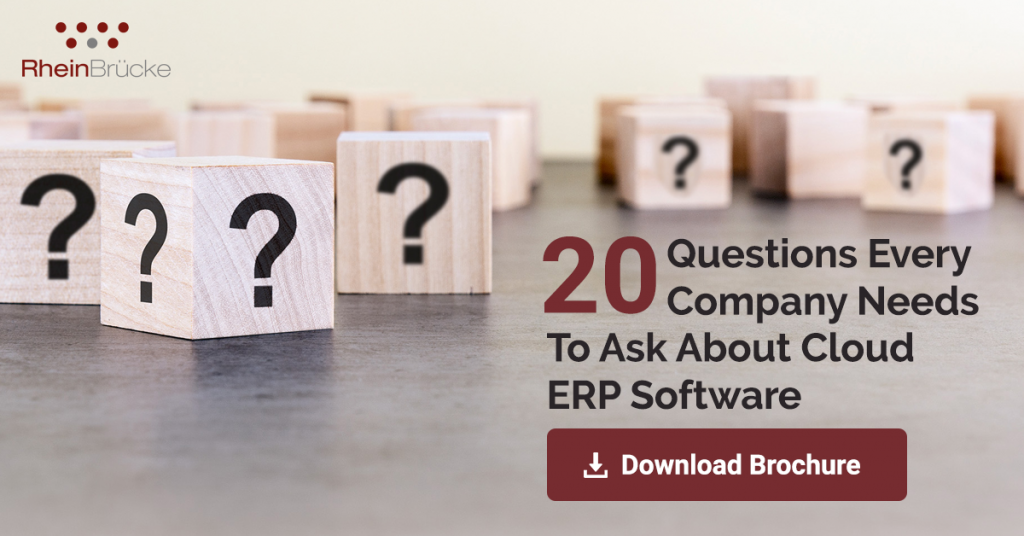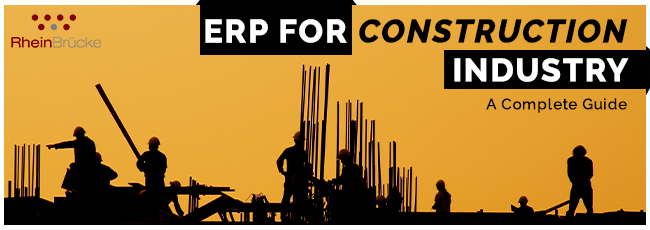
Construction is one of the fastest-growing industries in the world contributing to 6% of the global GDP and over $10 trillion spent on construction goods and services every year. According to Globalnewswire, the global construction industry market is expected to reach USD 17,247.96 billion by 2029. However, as the industry grows, it also poses a set of challenges. From meeting strict budgets and project deadlines to managing contractors, sub-contractors, construction materials, human resources, and assets, the operational costs can quickly add up. These challenges can make it difficult to keep track of everything, even those that aren’t visible on daily balance sheets. To overcome these complexities, an efficient Enterprise Resource Planning (ERP) system is a must. With an ERP system for construction industry, you can streamline your construction processes and keep everything in one place.
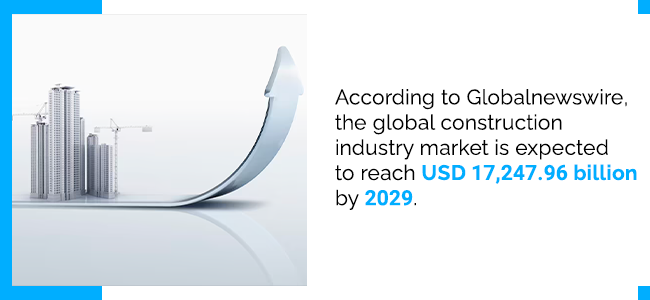
An industry-specific ERP system for construction industry is packed with customized modules to meet the unique needs of construction businesses and is completely integrated to provide 360-degree visibility and efficiency benefits.
In this blog we will talk about:
- What is an ERP system for construction?
- What are the typical challenges in construction industry?
- How can a construction ERP software help in resolving them?
- How to choose the best ERP software for construction industry?
- 5 best ERPs for construction industry
What is an ERP system for construction?
An ERP system for construction industry is a specially designed software that helps construction businesses in managing their entire business operations from pre-construction to post-completion. These solutions are specifically designed to address the complexities of the construction process, providing businesses with detailed project insights. By providing a centralized database to manage all operational, business, and project-based data, ERP solutions can help you efficiently manage finance, HR, warehouse, planning, and other construction-related activities. With an ERP solution, you can evaluate data in ways that simply aren’t feasible with separate systems, giving you the tools you need to take your business to the next level.
What are the typical challenges in construction industry?
The construction industry faces a range of challenges that can make it difficult for projects to be completed on time, within budget, and to the satisfaction of all stakeholders involved. Nonetheless, here are the top four common issues in this sector:
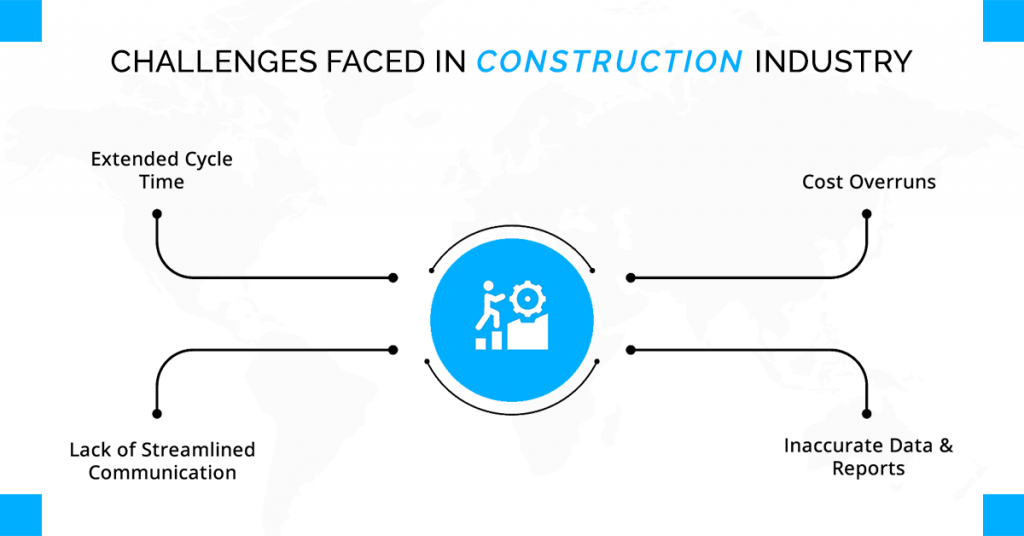
1. Extended Cycle Time
Cycle time is the amount of time it takes from beginning of a project until completion. Most construction companies have longer cycle times, which increases the risk of lower margins or significant losses in the labor expenses and unsatisfied clientele as a result of missed deadlines.
2. Cost Overruns
An unanticipated change in the project budget that boosts the overall project cost is known as a cost overrun. According to a McKinsey report, 98% of major construction projects experience cost overruns of more than 30%.
3. Inaccurate Data & Reports
Construction companies frequently find inaccuracies in equipment or material data records. Between what the system claims to have and what exists, there is frequently a discrepancy. In an Autodesk and FMI analysis (Harnessing the Data Advantage in Construction) survey, approximately half of the respondents stated that “bad” project data (i.e., inaccurate, insufficient, inconsistent, or redundant data) led to a negative outcome for one in every three project decisions.
4. Lack of Streamlined Communication
In construction industry effective information exchange is essential to the success of a project since it necessitates several professionals working from various locations and numerous contractors on the site throughout the construction phase. It is observed that there is often a communication gap between the office and the on-site employees like workers relying on word-of-mouth to provide crucial jobsite information, which most of the times leaves several staff members in the dark resulting in increased construction complications.
How a construction ERP software can help in resolving them?
Construction ERP systems can effectively address the industry’s long-standing issues by offering:
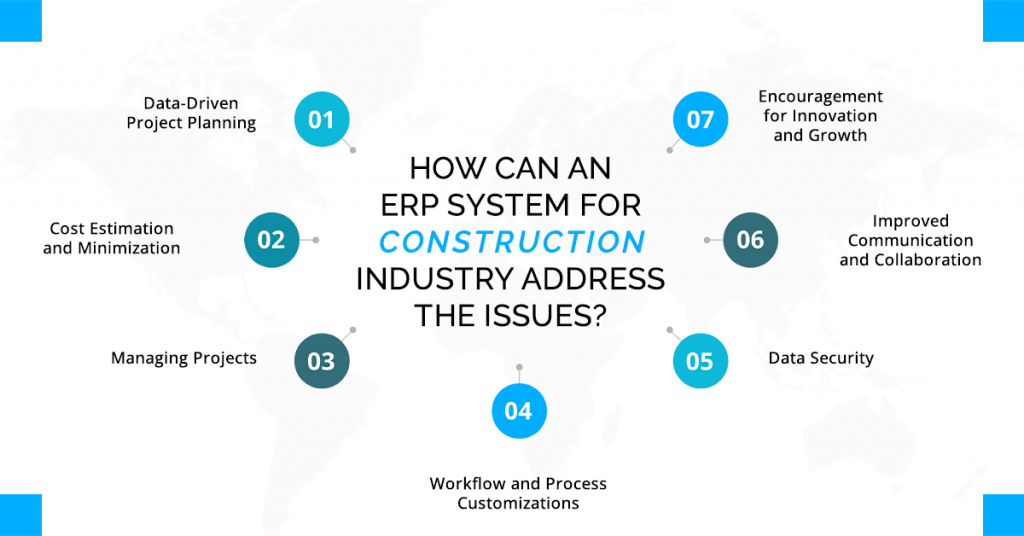
1. Data-Driven Project Planning
A construction company’s entire network of data sources can be consolidated through an ERP. Businesses can make better and more efficient use of the data to plan projects. This includes but not limited to planning of all expenses, labor requirements, essential materials & tools, and estimated profits. Data-driven planning aids in the identification of risks and bottlenecks quite early on during the project takeoff stage thus helping with the reduction of lead cycle time.
2. Cost Estimation and Minimization
ERP for the construction sector can provide precise estimation of raw materials, design, labour, and project timelines. These solutions can be used to calculate the profit and loss for each project to better manage and forecast the time and budget for upcoming initiatives.
3. Managing Projects
Using an ERP, construction companies can successfully manage different projects simultaneously in real time. ERP applications also provide improved project optimization by identifying and deploying the right resource at the right time and in the right location.
4. Workflow and Process Customizations
A robust construction ERP software enables you to create unique workflows and processes from the beginning. You can specify the order in which data or reports are sent across departments. This not just simplifies communication but also improves process efficiency and collaboration amongst stakeholders involved.
5. Data Security
ERP software features a central database that streamlines data exchange. To ensure secure permission-based access to the data stored within, the system offers optimal data security and user authorization. With features such as data backups and server protection, systems make it easy to ensure secure dataflow.
6. Improved Communication and Collaboration
Communication and information exchange are key to manage internal operations across all departments in the construction industry. ERP can help foster seamless communication and information exchange real time which can help increase project efficiency and empower individuals and teams in decision making.
7. Encouragement for Innovation and Growth
ERP system for the construction industry offer a great platform for combining cutting-edge applications, external systems, and ERP implementation best-practices into a single integrated solution. The ERP can be scaled to match the ever changing business needs of the organization as the construction company’s business volume, project complexities, and profitability grows.
How to choose the best ERP software for construction industry?
Construction businesses need ERPs that can enhance business processes rather just maintaining them. This means that these businesses should choose solutions that not only offer a complete package that supports the basic functions of a construction company, but also modern business modules suited to the current trend that has the ability to handle other complexities, such as managing all mechanical components of construction projects, project management, communication management across all partners, advance billings, and much more. Here is a list of some of the important construction ERP modules that you should look for when choosing an ERP for your business:
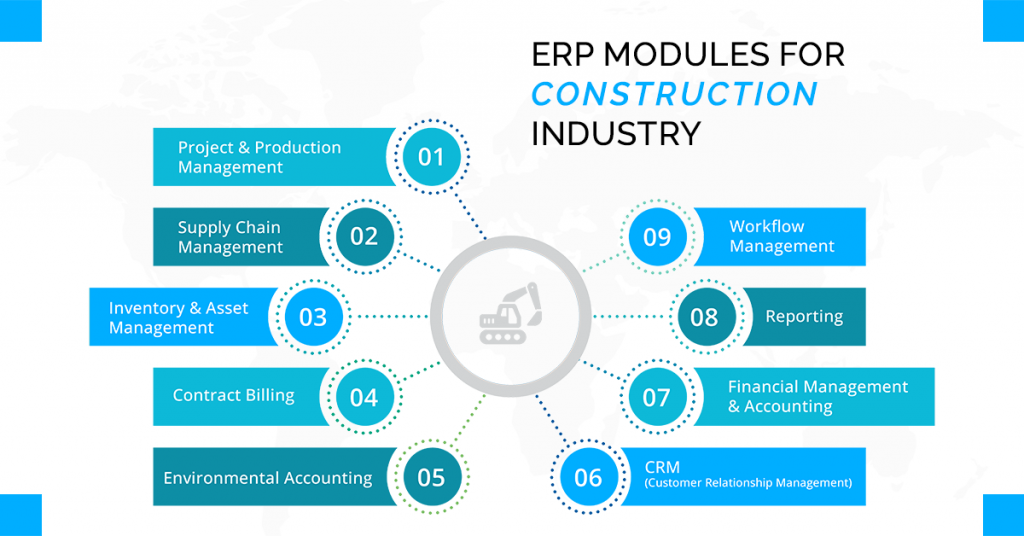
1. Project & Production Management
The construction ERP system’s project management module assists in managing all essential project details, such as supply, labour, equipment and machinery management, subcontractors, and project progress monitoring. The goal of production management is to improve the company’s effectiveness in employing its various resources at the right place at the right time, including raw materials.
2. Supply Chain Management
One of the key components of an ERP for the construction industry is supply chain management. It offers end-to-end solution for managing your suppliers, subcontractors, and supply chain.
3. Inventory & Asset Management
Using ERP software’s inventory management, you can acquire insight into your resource quantities and expenses. This helps to enhance materials requirement planning (MRP), gain a better understanding of company finances, cut expenditures, and make smart decisions. The asset management module of an ERP is focused on managing the capital assets (The equipment used in your construction projects) of your business. You can track the inventory levels and assets’ location with the help of this module. Additionally, it will notify you if a specific piece of equipment is currently out of warranty or requires maintenance.
4. Contract Billing
The contract billing module of an ERP for the construction industry enables you to manage billing accounts by client or project. It contains functionalities that allows you to keep track of your revenues, payables, and receivables based on the completion of tasks or projects.
5. Environmental Accounting
With the help of this module, you may adhere to widely accepted environmental regulations and guidelines for waste, water, and air emissions. It helps construction businesses adhere to the set norms and requirements to abide by environmental compliances and thus helping to improve sustainability.
6. CRM (Customer Relationship Management)
You can track incoming enquiries, estimation, quotation status, and client interactions all in one place with the help of a customer relationship management module. This allows you to manage and collaborate with your clients, subcontractors, and suppliers more efficiently and establish long-term relationships with them.
7. Financial Management & Accounting
The financial management module helps you with budgeting and auditing by providing real-time insights into financial data. To keep track of your construction company’s financial status, you can access financial data on a monthly, quarterly, and annual basis. The accounting module offers visibility across projects, finances, inventories, customer accounts, and other business-related processes.
8. Reporting
The reporting module provides comprehensive real-time reports , which helps improve the decision-making process. It also offers a collection of reporting analytics tools that go beyond the cash inflows and balance sheet statements to generate a detailed picture of the company’s health and how market fluctuations might impact your business success.
9. Workflow Management
Businesses can design and alter their workflow and approval processes using the ERP workflow modules. This module assists organizations in achieving their aim of managing workflow across different sites while adhering to the company and legal regulations.
5 best ERP for Construction Industry
Once you’ve determined your company’s need for a construction ERP , the next step is to choose the right provider and a solution to meet your requirements. It can be a challenging task since it involves detailed research and scrutiny of multiple solutions. To make your search easier, we’ve prepared a list of the best ERP for construction based on our market study:
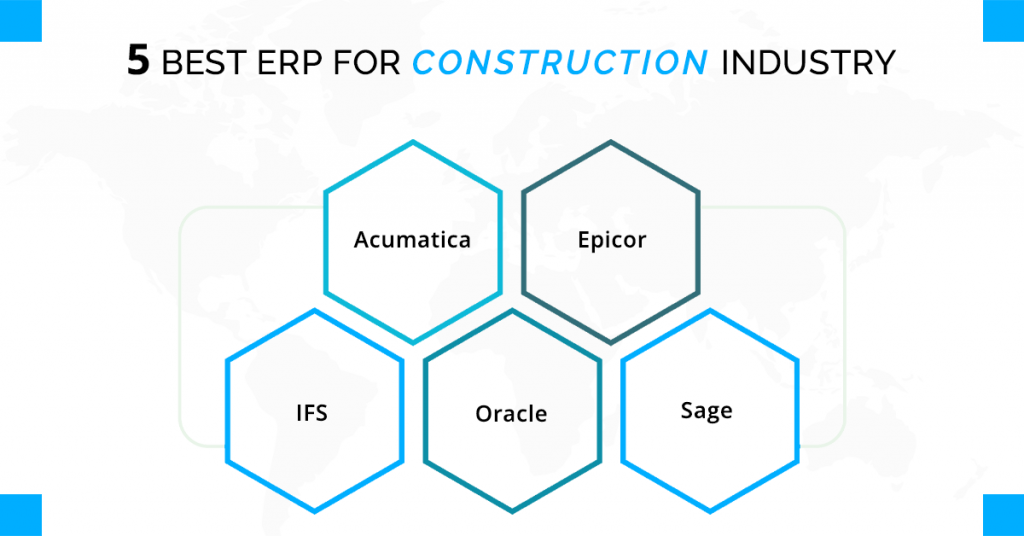
1. Acumatica
Acumatica‘s Residential & Commercial Construction Software offers users with a simple cloud-based solution for keeping projects on schedule and driving growth by ensuring that managers, subcontractors, supervisors, and consumers are all in sync. There is also Robust financial reporting, work cost accounting, integrated payroll operations, project billing, inventory management, business intelligence, and other capabilities.
2. Epicor
Epicor for Construction and Engineering is an industry-specific ERP system that integrates seamlessly with your existing IT infrastructure. It assists businesses in optimizing processes such as inventory and labor management, asset management, project estimation, budget planning, resource scheduling, contract management, and so on. EPICBuild by RheinBrücke is a tailor-made system for managing all aspects of your EPC company, from subcontractors to material outsourcing assignments, as well as plant management to managing mobile assets and field personnel.
3. IFS
IFS‘s products are designed to be user-friendly, versatile, and modular. IFS’s applications business software includes CRM, SCM, PLM, EOI, enterprise asset management, and MRO capabilities. Construction firms may use IFS as a project-based ERP system to monitor and decide timelines across functions, integrated departments and sustain goals through increased visibility and transparency.
4. Oracle
Companies can use the Oracle Smart Construction Platform to connect project teams, empower decision-makers, transform data into valuable insights, coordinate resources for efficient project delivery, and synchronize operations across the supply chain.
5. Sage
Construction firms can use software such as Sage Intacct Construction, Sage 100, Sage 300, Sage ToolOps, and Sage Estimating. Businesses can use these solutions to improve field activities, financial management, accounting, pre-construction project management, payroll administration, and other processes in the construction industry.
Conclusion
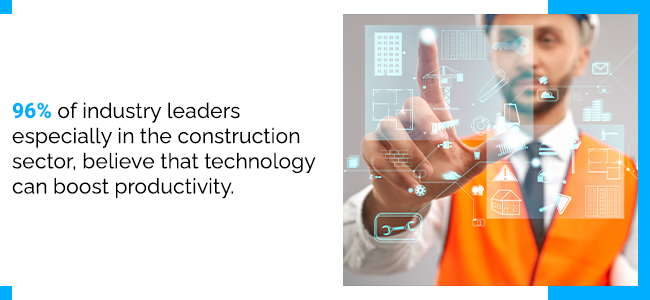
Technology simplifies everything. 96% of industry leaders especially in the construction sector, believe that technology can boost productivity. By utilizing top-notch Construction ERP software, you can simplify your construction operations while ensuring accuracy, on time delivery and quality.
If your company is planning to implement ERP construction software and needs help narrowing down your options, don’t hesitate to contact us.




